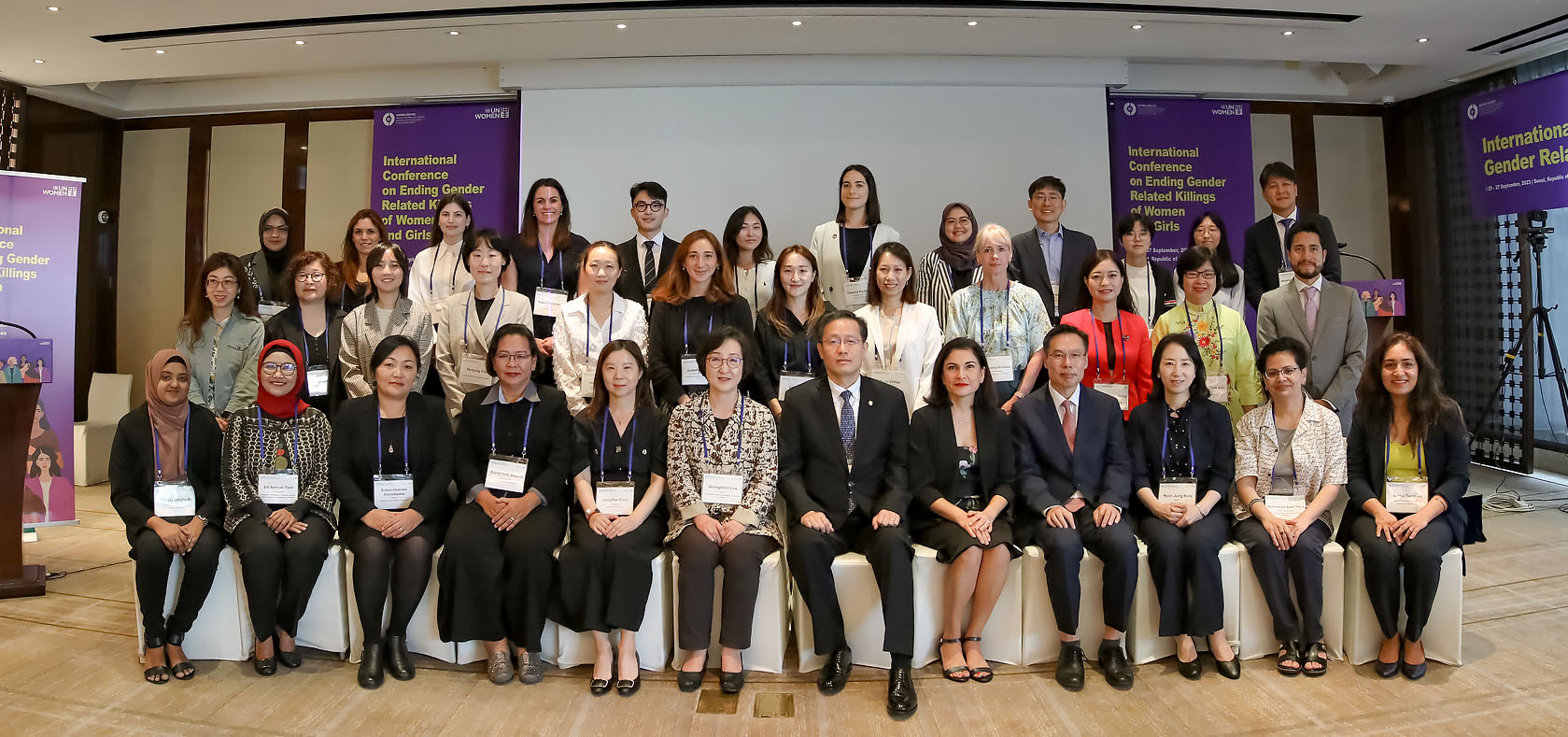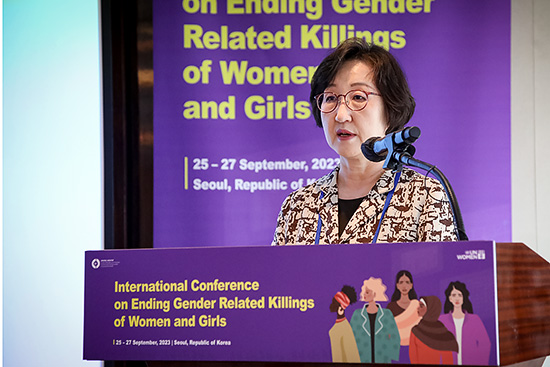[Press release]

Representatives and experts from government, academia and civil society in Asia-Pacific, Europe and Latin America attended the ‘International Conference on Ending Gender-Related Killings of Women and Girls.’ Photo: UN Women/Kwanju Kim
English | 한국어
Seoul, Republic of Korea — More than 60 international experts gathered for the first international conference discussing the standardized definition and statistical approach to measuring femicide (the gender-related killings of women and girls) in Asia and the Pacific region. Taking place in Seoul from 25–27 September online and in-person, the “International Conference on Ending Gender-Related Killings of Women and Girls” was co-organized by UN Women Centre of Excellence for Gender Equality, and the United Nations Office for Drugs and Crime (UNODC)-Statistics Korea (KOSTAT) Centre of Excellence for Statistics on Crime and Criminal Justice in Asia and the Pacific.
Hyoung Il Lee, Commissioner of KOSTAT said “Developing a comprehensive statistical framework for femicide that can be utilized on an international scale necessitates collective efforts from all sectors of society. It goes beyond the roles of governments, academia and activists and requires the engagement of our entire society. The discussions that unfold here will serve as the cornerstone upon which we can build a society where women can live free from the shadow of all forms of violence.”

Jeongshim Lee, Director of the UN Women Centre of Excellence for Gender Equality, opened the three-day ‘International Conference on Ending Gender-Related Killings of Women and Girls.’ Photo: UN Women/Kwanju Kim
Jeongshim Lee, Director of the UN Women Centre of Excellence for Gender Equality, noted that “Unlike other forms of violence against women, there is not yet a global or regional standardized approach to defining and producing relevant metrics on killings of women and girls. In this light, UNODC and UN Women jointly developed the Statistical Framework for Measuring the Gender-Related Killing of Women and Girls to provide a statistical definition of femicide that can clearly identify data and statistics that accurately count femicide cases”.
According to the joint report Gender-related killings of women and girls (femicide/feminicide) published by UN Women and UNODC in 2022, out of the estimated 81,100 female homicides in 2021, roughly 4 in 10 have no contextual information to allow them to be identified and counted as gender-related killings. Furthermore, many countries rely on local legal definitions or practices that differ greatly. This inconsistency results in a lack of international comparability in statistical data on femicide.
Discussions mainly revolved around the implementation of the Statistical Framework for Measuring the Gender-Related Killing of Women and Girls (also referred to as “femicide/feminicide”), developed by UN Women and UNODC last year. The statistical framework is composed of three main data blocks identified through a series of clearly defined and objective characteristics of a homicide. i. Women and girls killed by an intimate partner, ii. Women and girls killed by other family members, iii. Women and girls killed by other perpetrators (known or unknown) according to modus operandi or context indicative of gender-related motivations.
Melissa Alvarado, Regional Advisor on Ending Violence against Women in UN Women’s Asia and the Pacific Regional Office added that: “Establishing a standardized definition and identifying the key characteristics that discern gender-related motivation or drivers behind homicides of women and girls are the initial steps towards evidence-based prevention policies.”
During the conference, 20 government focal points on violence against women and homicide, police officers from six countries (Cambodia, Fiji, Indonesia, Mongolia, Pakistan and Viet Nam), along with 30 experts from Latin America, Europe and Asia and the Pacific regions, as well as 10 experts from UN Women and UNODC, exchanged current practices on collecting, disaggregating, analysing and reporting data related to femicide while addressing associated challenges.
Experts expressed that it is necessary for national data systems on intentional homicides of female victims to register characteristics regarding the relationship between perpetrator and victim, and the modus operandi or context of the intentional homicide. Participants also highlighted the importance of improving the collection and utilization of administrative data on violence against women and girls, as well as putting in place monitoring mechanisms.

